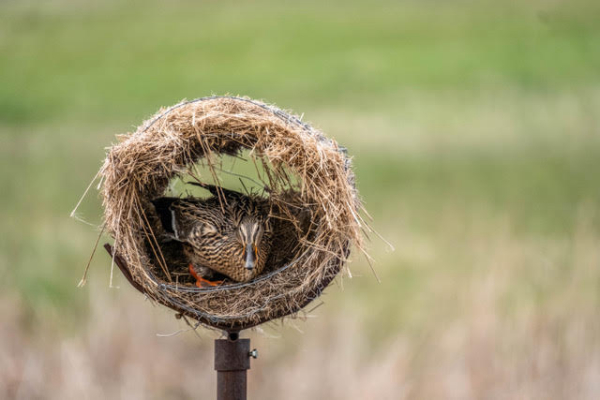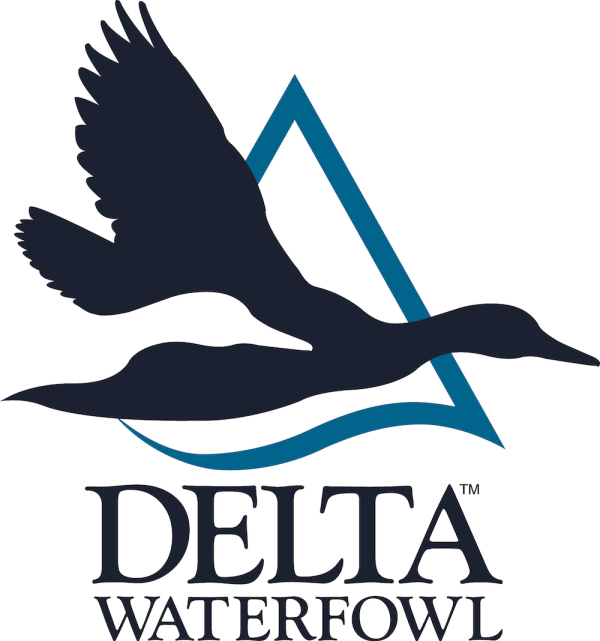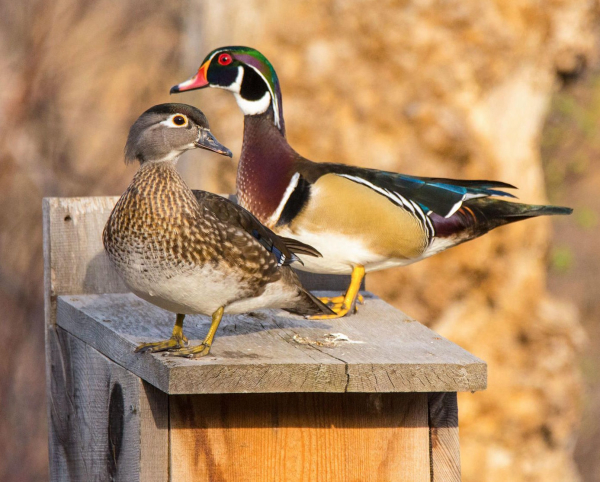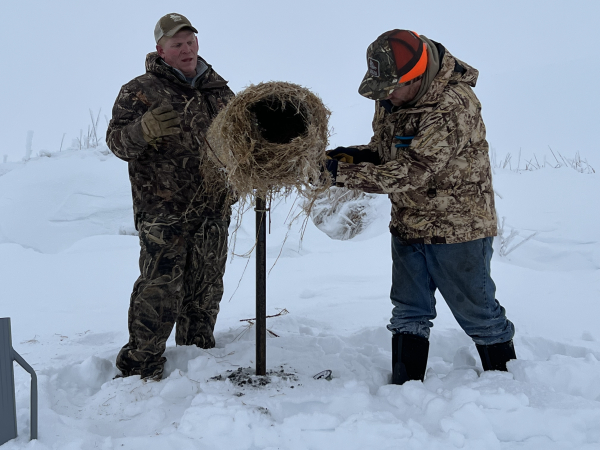Delta Waterfowl HunteR3 and Duck Production Programs Receive Funding Boost

A pair of grants from Wildlife Habitat Canada will add Hen Houses and expand hunter recruitment across Canada
WINNIPEG, MANITOBA — Grants from Wildlife Habitat Canada have been awarded to Delta Waterfowl to bolster the organization’s Hen House program, as well as HunteR3 recruitment and advocacy efforts.
A $60,000 WHC grant will support the growth and management of Delta’s Hen House program in Canada, adding new Hen Houses to the duck production effort. The grant will be used to build and install 200 new Hen Houses in Canada, as well as to support the maintenance of 750 existing nest structures. The new Hen Houses will be installed in the Canadian prairie pothole region, likely in mallard-producing regions of Alberta and Saskatchewan.
By providing a safe, productive nest site to mallard hens, these over-water nest structures make a successful hatch up to 12 times more likely. For hens nesting in grass cover, nest success is often less than 10 percent—a dismal rate that falls below the necessary level to maintain duck populations. In Hen Houses, nest success typically ranges from 60 to 90 percent.
Hen House maintenance is generally conducted between January and the end of March to ensure Hen Houses are ready when hens return from wintering locations. Contractors also utilize an app to transmit their location and Hen House information (usage, condition, etc.) to ensure all Hen Houses are maintained annually and their information is accurately logged. Currently, Delta Waterfowl maintains more than 10,000 Hen Houses in North America—7,100 of which are in Canada.
A second $70,000 WHC grant will help secure the future of waterfowl hunting in Canada by supporting Delta’s HunteR3 efforts. HunteR3 includes First Hunt, the largest waterfowl-specific hunter recruitment program in North America and the University Hunting Program, which educates non-hunting wildlife students about hunting’s role in conservation.
WHC funds support Delta’s mentored hunts, workshops, and camps across Canada. Importantly, the grant supports Delta’s proactive efforts to make it simpler to become a hunter by providing additional opportunities and removing barriers. These efforts include Delta’s growing University Hunting Program which will operate with 10 to 12 schools across the country. The organization expects to engage some 1,250 participants in these efforts that are largely delivered and supported by Delta’s dedicated chapter volunteers.
“We are honored receive the generous and ongoing support of WHC,” said Alan Cattrysse, Delta’s R3 coordinator for Canada. “Our programs are having a direct impact on the future of waterfowl hunting, benefitting both ducks and duck hunters. The fact these funds are generated though duck stamp sales add a level of responsibility and determination to deliver effective programs on duck hunter’s behalf.”
WHC grants are funded by the sales of the Canadian Wildlife Habitat Conservation Stamp and Print, commonly called the “duck stamp.” This stamp, costing $8.50, is a required component of a legal waterfowl hunting permit. Using the revenue, WHC offers grants to conserve, restore, and enhance wildlife habitat, foster conservation leadership, promote conservation contributions of waterfowl hunters, and encourage waterfowl hunting participation. Since 1985, the stamp has contributed more than $55 million toward waterfowl conservation.
“WHC’s longstanding support of Delta plays an essential role in the success of our Canadian-based programs,” said Jim Fisher, Delta’s vice president of Canadian policy. “The approval of these grants reinforces their confidence in our programs and propels our commitment to protect and enhance the future of hunting in Canada.”
The 2023 Canadian duck stamp will be available for purchase Aug. 1. For more information regarding the stamp and print, visit whc.org. Also, attendees can keep an eye out for the federal duck stamp print at their upcoming Canadian Delta banquet.
Delta Waterfowl is The Duck Hunters Organization, a leading conservation group working to produce ducks and secure the future of waterfowl hunting in North America. Visit deltawaterfowl.org.
For more information about Delta Waterfowl’s work in Canada, please contact Jim Fisher at jfisher@deltawaterfowl.org.






